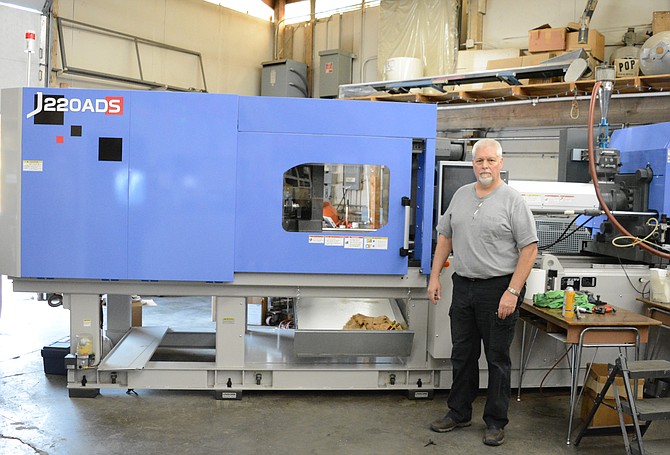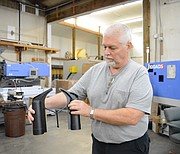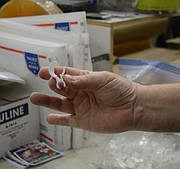Kellogg Plastics: Challenges spark creative solutions

Bruce Rumpel stands in front of one of the new electric machines at Kellogg Plastics in Smelterville. The company currently has a staff of five and creates plastics through injection mold machinery.
SMELTERVILLE — Kellogg Plastics Founder Don Rumpel is 94 years old and retired, but his mind is always still thinking of new designs. Plastic lighting clips and items like the cane clip were his brainchild. His son, Bruce Rumpel, is proud to continue the work of creating plastics designed by his father.
“Every one of these clips are his patents, and he’s working on a new one,” Bruce Rumpel said.
Don Rumpel had worked as a carpenter and in construction and didn’t intend to get into fabricating plastics, but setbacks to receiving much needed plastic parts for a project spurred him to take matters into his own hands, and thus, the company was born.
The Rumpels are big believers in stepping up to a challenge, and Don Rumpel set out to get a plastic injection molding machine and learn how to make their own pieces.
“It’s kinda amazing when you think of how it got started and where it got started from. The reason we got into this is that we got tired of waiting for someone to do it,” Bruce said.
Kellogg Plastics currently has five employees and was created in 1986. Though the company has been in Smelterville for decades, the name reflects their original location. Online giants such as Overstock and Wayfair buy lighting clips from Kellogg Plastics, and regional shops such as McLendon Hardware in Seattle, Wash. sell their products.
“When we moved out here to Smelterville, we had two machines and two employees,” Bruce said.
Bruce’s uncle, Delbert Rumpel, was known for having designed the dance floor in the movie, “Saturday Night Fever” as an electrical engineer and was the family connection to getting into the first wave of LED lights before the lighting manufacturing moved to China due to production costs. The company pairs premade high-end lighting with their decorator “quik klips” and has begun selling them online in the last several years as the demand became apparent.
“You either start playing with everyone else, or you get run over,” Bruce said.
The majority of the business coming in is through a long-standing connection with PEET Boot Dryers. Kellogg Plastics manufactures the plastics that make the structure of the dryers. Due to complications in the many variables that go into the manufacturing process, this year, PEET is requiring fewer plastic frames than they usually order from the Smelterville business.
“We’ll survive it. We’ve survived everything else,” Bruce said.
The company uses a combination of older hydraulic machines and new electric machines on the workroom floor. Though some manufacturing companies have multiple shifts with machinery running continuously, Kellogg Plastics has been able to get a lot of mileage out of having a single well-staffed shift and running the machines during the day with regular maintenance from Summit Molds in Post Falls.
One of the hydraulic machines purchased in 1996 has run millions of cycles in plastic manufacturing over the years and is still running strong.
The company has invested in three new injection machines in the last five years, and the savings on electrical use has been encouraging.
“I’ve cut almost half the amperage between the three,” Bruce said.
According to Avista, the investment will save Kellogg Plastics 30% on utilities with the new electric machines when it comes to power/amperage usage.
“To make plastics, you need to have power, water and a grinder,” Bruce said.
The plastic injection machines can create eight “quik klips” at once, and plastic designs are often made from polycarbonate for strength and ABS for flexibility to make sure that the end result isn’t brittle.
Heat and water are used to help with managing the temperature of the plastic designs being made, keeping them between 160 to 180 degrees Fahrenheit to make sure that the plastics are able to “flow.” Plastics also need time to dry before they can be shipped.
Supply chain issues when it comes to raw material have been one of the biggest hurdles for the company, beginning during the early days of the pandemic, but have persisted. Bruce’s solution is to buy more material ahead of production so that work can remain unaffected by issues.
“We’re more or less holding our own,” Bruce said.
Business information:
What: Kellogg Plastics
Where: 113 E. Main St., Smelterville ID 83868
Operating hours: 5:30 a.m. to 4:30 p.m., Monday-Friday












